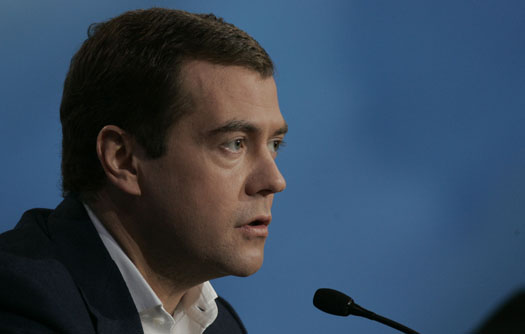
Medvedev Forms a Commission to Protect Russian History
Publication: Eurasia Daily Monitor Volume: 6 Issue: 98
By:

Russian President Dmitry Medvedev has recently made public comments about "the falsifiers of history," attacking the country and its heritage. This was a serious political statement of strategic importance – not merely a rhetorical proclamation, made just before the World War II Victory-Day military parade on May 9: "We will not allow anyone to undermine the sacrifice of our people" (EDM, May 13). Medvedev’s statement was followed by the creation of a special presidential inter-departmental commission: "the commission to counteract against attempts to falsify history that undermine the interests of Russia." The presidential order to set up this "historic truth" commission was signed on May 15 and published on the Kremlin website on May 19 together with a list of its members (www.kremlin.ru, May 19).
The state-controlled television (Rossiya TV, NTV, and First Channel) immediately lavished praise on "the timely move" to save Russian history from the "falsifiers" -namely the authorities in the Ukrainian, Georgian and Baltic republics.
However, the more independent press was much more critical, pointing out that in the 28-member commission there are only three professional historians, and even these are not independent researchers, but government-appointed directors of two official historical research institutions and the chief of the official Russian government archive. Instead of appointing independent historians, the commission has been filled with high-ranking bureaucrats as well as a number of pro-Kremlin spin-doctors and nationalistic lawmakers. Two commission members – Sergey Markov and Konstantin Zatulin – have been banned from entering Ukraine for allegedly promoting the transfer of Crimea to Russia. Zatulin has been accused of being one of the organizers of the mass distribution of Russian passports in Abkhazia and South Ossetia that was used as a justification of the Russian invasion last August. Fear has been expressed that the commission may punish liberal historians or dissidents (Kommersant, Vedomosti, Nezavisimaya Gazeta, May 20).
"There are only three historians there, and even they are not recognized among professionals," prominent historian Roy Medvedev told Kommersant. "I am afraid that the commission will be used for witch-hunts and the settling of scores," the military historian Alexei Isayev commented to Kommersant. "If we are going back to those [Soviet] years, then hopes for Medvedev the liberal, in whose name the commission is being established, are somewhat unjustified," Alexei Malashenko, an analyst with the Carnegie Center in Moscow, warned in Nezavisimaya Gazeta.
These fears, though justified and genuine, might be somewhat misplaced. The Russian authorities already possess sufficient legal power under the existing "anti-terrorist" and "anti-extremist" laws to punish dissidents. In addition, the Duma is reported to be rushing through amendments to the Penal Code to make the "falsification of history" a criminal offense. The first reading of the anti-falsification law is planned for June 3 (Vedomosti, May 20). However, as a body the new "historic truth" commission per se appears to be too powerful and administratively weighted to be exclusively or primarily aimed at silencing the few independent researchers, dissidents and writers in contemporary Russia.
The overall composition of the "historic truth" commission follows the pattern of other commissions that formulate Russian foreign, defense and national-security policies by establishing an inter-departmental consensus -which is the foundation of Russian executive decision-making. The actual composition of such commissions always includes prominent representatives of departments and ministries concerned about particular issues, which might prove an indicator as to any sanction they recommend.
The chairman of the newly established "historic truth" commission is the chief of Medvedev’s administration Sergei Naryshkin, a well-known loyal supporter of Prime Minister Vladimir Putin. A number of other prominent presidential administration figures are members of the commission. The justice and culture ministers are represented by deputies as well as the chiefs of the government departments of education, science and the mass media. Deputy Chiefs also represent the foreign ministry and the security council. The intelligence community is represented by the Foreign Intelligence Service (SVR) and the Federal Security Service (FSB). The commission member from the armed forces is the top Russian military commander, the Chief of General Staff and First Deputy Defense Minister, Army-General Nikolai Makarov. The official task of the commission is to "analyze information about the falsification of historic facts aimed against Russia," to prepare "recommendations on adequate reactions to falsifications that hinder Russian interests and to neutralize their possible negative consequences" (www.kremlin.ru, May 19).
The language is clearly aimed not at dissidents, but at Russia’s neighboring states and the presence of such prominent figures as the chief of administration and the Chief of the General Staff might indicate that military action such as the war last August against Georgia is not excluded. The Georgian authorities are not attempting to rehabilitate any Nazi collaborators. However, Rossiya TV on May 19 accused them of falsifying history by assuming that Georgia was annexed by imperial Russia. According to Moscow, the Georgians gladly volunteered to join the Russian empire. After the commission makes its recommendations and adequate action is taken to "neutralize," dissidents, the Georgians, Ukrainians and others might face additional pressure to submit to the Kremlin’s views.




